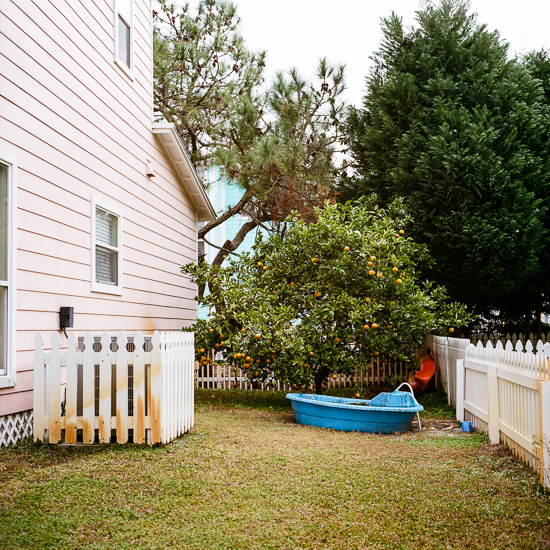 The hall and the door and shelves full of the first names of things. Block. Card. Soft. Red.
The hall and the door and shelves full of the first names of things. Block. Card. Soft. Red.
Much later on. A house in the country with a backroom full of antique shoes. Her friend collected them. Button shoes and laces and patent leather, ancient and dull-cracked. White wedding shoes with loose strings of beads, satin snagged by the claws of some feral animal that climbed in the open window at night. She slept there sometimes when her friends cooked feasts of soup beans and passed corn liquor. At night she lay there, listening to the fiddle tunes and voices from the front room and wishing this house of ghost songs and wood smoke was her own.
Another time there was a house on a street in a college town, one with a gravel parking lot across the way that stayed empty on Sundays, the days she loved the best. For a long time, in that house, her father called her on Sunday mornings, left messages on her answering machine that floated upstairs to where she lay asleep with her small black-and-white dogs. Give some time, her father’s voice said, to the good Lord Jesus. The window of her room opened onto the street, and her legs itched with longing, but she did not get up.
Houses have been to her a vessel. A womb. A nest and an empty cup and a cave echoing with voices she will remember the rest of her life. Her mother’s hands smooth the covers over her in dreams of these houses. In others, lovers climb the wooden stairs step by step, but never reach the door of a room that counts. Houses are rooms with doors that want to close, fans that want to move, cool air across her bare skin as she lies on the bed.
When she was small, her granny owned the house she will remember best. Sun porch, red-tiled kitchen, back bedroom with a fireplace where coal held the heat a long, long while. In the upstairs room of that house was a hollow wall where they once found a trunk full of letters and deeds and one X-ray of a hand.
We comfort ourselves, says Gaston Bachelard, by reliving memories of protection. Memories of the outside world will never have the same tonality as those of home, he says. And, by recalling these memories, we add to our store of dreams; we are never real historians, but always near-poets, and our emotion is perhaps nothing but an expression of a poetry that was lost.
For years, she herself will be lost. Consider the houses. Florida. Virginia. North Carolina. South Carolina. West Virginia. Rental houses. Lovers’ houses. Neighbors’ houses. Abandoned houses beside roads along which she runs for miles but never seems to quite reach the end. Beside one such road there is a cemetery atop a small, steep hill where she imagines the ghost of woman in an apricot-colored dress.
Dreamed houses, she has read, indicate the state of the soul. She dreams of cellars and attics, of the expanse of wooden floors where there were dancers and the smooth soles of shoes.
Her house will have sunlight and love and the reach of hands across the clean, clear glass of windowpanes.
—
Karen Salyer McElmurray’s Surrendered Child: A Birth Mother’s Journey was an AWP Award Winner for Creative Nonfiction. Her novels are The Motel of the Stars, Editor’s Pick by Oxford American, and Strange Birds in the Tree of Heaven, winner of the Chaffin Award for Appalachian Writing. Other stories and essays have appeared in Iron Horse, Kenyon Review, Alaska Quarterly Review, and Riverteeth, and in the anthologies An Angle of Vision; To Tell the Truth; Fearless Confessions; Listen Here; Dirt; Family Trouble; and Red Holler. Her writing has been supported by grants from the National Endowment for the Arts, the North Carolina Arts Council, and the Kentucky Foundation for Women. Most recently, her essay, “Strange Tongues,” was the recipient of the Annie Dillard Award from The Bellingham Review. In Spring 2014, she will be the Lewis Rubin Writer-in-Residence at Hollins University.

4 comments
Jackie says:
Sep 20, 2013
beautiful.
Brevity: sustenance | littlebpost says:
Oct 9, 2013
[…] Brevity: sustenance […]
Sharon Rawlette says:
Nov 5, 2013
“[L]overs climb the wooden stairs step by step, but never reach the door of a room that counts.”
This is a haunting line. A metaphor that keeps giving as long as you stay with it. I’ve written it down. Someday, it will become the epigraph of a book of mine.
A little departure…a virtual tour…. | Marginalia says:
Aug 17, 2014
[…] Brevity https://brevitymag.com/nonfiction/consider-the-houses/ […]